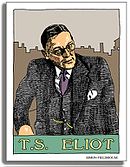Related Research Articles

Middlemarch, A Study of Provincial Life is a novel by English author Mary Anne Evans, who wrote as George Eliot. It appeared in eight installments (volumes) in 1871 and 1872. Set in Middlemarch, a fictional English Midlands town, in 1829 to 1832, it follows distinct, intersecting stories with many characters. Issues include the status of women, the nature of marriage, idealism, self-interest, religion, hypocrisy, political reform, and education. Despite comic elements, Middlemarch uses realism to encompass historical events: the 1832 Reform Act, early railways, and the accession of King William IV. It looks at medicine of the time and reactionary views in a settled community facing unwelcome change. Eliot began writing the two pieces that formed the novel in 1869–1870 and completed it in 1871. Initial reviews were mixed, but it is now seen widely as her best work and one of the great English novels.

Kate O'Mara was an English film, stage and television actress, and writer. O'Mara made her stage debut in a 1963 production of The Merchant of Venice. Her other stage roles included Elvira in Blithe Spirit (1974), Lady Macbeth in Macbeth (1982), Cleopatra in Antony & Cleopatra (1982), Goneril in King Lear (1987) and Marlene Dietrich in Lunch with Marlene (2008).

Ring for Jeeves is a novel by P. G. Wodehouse, first published in the United Kingdom on 22 April 1953 by Herbert Jenkins, London and in the United States on 15 April 1954 by Simon & Schuster, New York, under the title The Return of Jeeves.
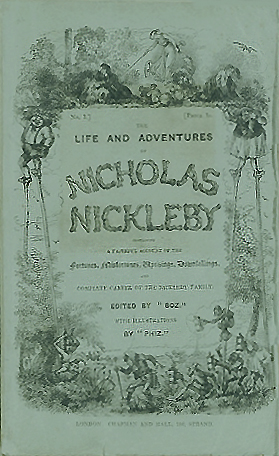
Nicholas Nickleby, or The Life and Adventures of Nicholas Nickleby, is the third novel by Charles Dickens, originally published as a serial from 1838 to 1839. The character of Nickleby is a young man who must support his mother and sister after his father dies.

Grace Dalrymple Elliott was a Scottish courtesan, writer and spy resident in Paris during the French Revolution. She was an eyewitness to events detailed in her memoirs, Journal of my life during the French Revolution published posthumously in 1859. She was mistress to the Duke of Orléans and to the future George IV, by whom she is said to have borne an illegitimate daughter. Elliott trafficked correspondence and hid French aristocrats escaping from the French Revolution. She was arrested several times but managed to avoid the guillotine, and was released after the death of Robespierre.
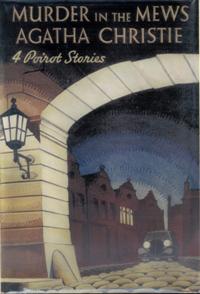
Murder in the Mews and Other Stories is a short story collection by British writer Agatha Christie, first published in the UK by Collins Crime Club on 15 March 1937. In the US, the book was published by Dodd, Mead and Company under the title Dead Man's Mirror in June 1937 with one story missing ; the 1987 Berkeley Books edition of the same title has all four stories. All of the tales feature Hercule Poirot. The UK edition retailed at seven shillings and sixpence (7/6) and the first US edition at $2.00.

A.J. Quartermaine is a fictional character from General Hospital, an American soap opera on the ABC network. Born on-screen in 1979 as the only biological child of the iconic Drs. Alan and Monica Quartermaine, A.J. was "SORASed" in 1991, revising his birth year to 1973. The role has been most notably portrayed by the actors Sean Kanan from 1993 to 1997 and Billy Warlock from 1997 to 2003, with a brief return in 2005. Kanan made his on-screen return as A.J. on October 26, 2012, after a 15-year absence. Kanan announced in March 2014 that he would once again be leaving the series, voicing his disappointment over the writing for the character.

Dominique Deveraux is a fictional character on the ABC prime time soap opera Dynasty and its spin-off, The Colbys. Portrayed by Diahann Carroll from 1984 to 1987, the character is the surprise half-sister of millionaire Blake Carrington. Dominique was written out of the series at the end of its seventh season, and did not return for the 1991 miniseries Dynasty: The Reunion.

Let's Be Happy is a Technicolor 1957 British musical film starring Tony Martin, Vera-Ellen and Robert Flemyng and directed by Henry Levin. It was written by Dorothy Cooper and Diana Morgan in CinemaScope. This film was an updated remake of Jeannie (1941), starring Barbara Mullen, which itself was based on the stage play Jeannie by Aimée Stuart.
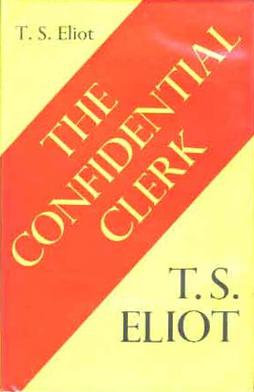
The Confidential Clerk is a comic verse play by T. S. Eliot.

Monica Scott Colby is a fictional character from the ABC television series Dynasty and its spin-off The Colbys, both created by Richard and Esther Shapiro. Portrayed by Tracy Scoggins, the character was introduced on Dynasty in the November 1985 two-part episode "The Titans" as the lawyer daughter of wealthy California CEO Jason Colby and his socialite wife, Sable. Scoggins was subsequently a series regular on The Colbys for two seasons from 1985 to 1987. She reappeared as Monica on Dynasty for its final eight episodes in 1989.
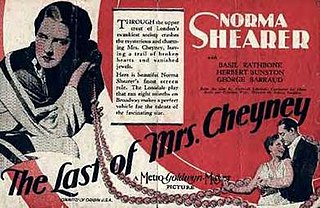
The Last of Mrs. Cheyney is a 1929 American Pre-Code comedy-drama film directed by Sidney Franklin. The screenplay by Hanns Kräly is based on the 1925 play of the same name by Frederick Lonsdale which ran on Broadway for 385 performances. The film was remade twice, with the same title in 1937 and as The Law and the Lady in 1951.
Personal Enemy is a play by John Osborne and Anthony Creighton. It was written in 1954, prior to Osborne's 'big break' with Look Back in Anger at the Royal Court Theatre in 1956, and first performed in Harrogate in 1955. It was thought that the play manuscript was lost, but copies were found in the Lord Chamberlain's archive in the British Library in 2008. The two plays were subsequently published as Before Anger, with a foreword by Peter Nichols. Personal Enemy was produced in its uncensored form for the first time in 2010 at the White Bear Theatre, as part of their Lost Classics Project, before transferring to New York's Brits Off Broadway festival at 59E59 Theaters in November of that year. The play is the only work by Osborne to be set in the United States.

The Law and the Lady is a 1951 American comedy film directed by Edwin H. Knopf and starring Greer Garson, Michael Wilding and Fernando Lamas. It is not related to the Wilkie Collins novel The Law and the Lady. Very loosely based on the 1925 play The Last of Mrs. Cheyney by Frederick Lonsdale, the action is transferred to the turn of the century, the names are all changed, and the first half of the film shows the history of the two thieves. Previous film versions of the story, made in 1929, starring Norma Shearer, and 1937, starring Joan Crawford, retained the play's contemporary setting, included a crew of confederates, and opened with Mrs. Cheyney as an established figure in society.. This film also ends differently from the play, with the partners in crime ending as romantic partners but going back to England to face the music for their very first swindle. In the play and in the two other films, Charles leaves and Mrs. Cheyney accepts Lord Dilling, who kisses her and declares: “That's the Last of Mrs. Cheyney!”

Finding Neverland is a musical with music and lyrics by Gary Barlow and Eliot Kennedy and a book by James Graham adapted from the 1998 play The Man Who Was Peter Pan by Allan Knee and its 2004 film version Finding Neverland. An early version of the musical made its world premiere at the Curve Theatre in Leicester in 2012 with a book by Allan Knee, music by Scott Frankel and lyrics by Michael Korie. A reworked version with the current writing team made its world premiere in 2014 at the American Repertory Theater in Cambridge, Massachusetts. Following completion of its Cambridge run, the production transferred to Broadway in March 2015.

Jules Henry Sherek (1900–1967) was a British theatrical manager, known for producing the plays of T. S. Eliot.
Come On, Jeeves is a comedic play co-written by Guy Bolton and P. G. Wodehouse. The play was written in the summer of 1952, and toured the English provinces in the summer of 1954. Wodehouse adapted the play into the novel Ring for Jeeves, which was first published in April 1953, a year before the play reached production. Come On, Jeeves is still occasionally produced and was presented as recently as December 2017.
References
- ↑ "The Elder Statesman" City Paper. Retrieved 2014-5-5.
- ↑ Darlington, W. A. (2004). "Henry Sherek". Oxford Dictionary of National Biography . Oxford University Press . Retrieved 27 July 2014.
